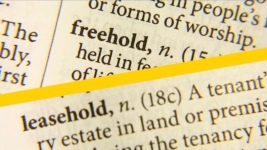Introduction
 Thousands of people who bought new build houses have now realised that, through no fault of their own, they have bought a leasehold house with bad ground rent terms. In addition there are costly lease terms that mean they have to pay the freeholders fees for permission to alter their homes, change carpets, carry out DIY and even to sell their own properties.
Thousands of people who bought new build houses have now realised that, through no fault of their own, they have bought a leasehold house with bad ground rent terms. In addition there are costly lease terms that mean they have to pay the freeholders fees for permission to alter their homes, change carpets, carry out DIY and even to sell their own properties.
This has lead many to the conclusion that the only option is to buy the freehold of their own home but are confused about how to go about it and what is involved. This confusion adds considerably to an already stressful situation, so I would like to offer some clear advice on the best option you have to get out of this unjust situation.
There are two different ways to buy the freehold of your home
You have a legal right to buy your freehold under the 1967 Leasehold Reform Act. Here there is a legal process to follow with a statutory valuation method set down by law. If the freeholder will not agree to negotiate fairly you have a legal right to force them to and you are offered legal protection on the terms of the freehold purchase.
To many people this process may seem daunting and uncertain and understandably people shy away from it.
The other option is to contact your freeholder directly and ask them how much they want from you to buy the freehold and see what figure they come back with, this is called an ‘informal’ deal.
The purpose of this article
I have now been contacted by hundreds of people who are asking my advice on whether the best option they can take to buy the freehold of their house is to negotiate the cost of doing so directly with their freeholder.
I have already written a very comprehensive article entitled ‘The leasehold houses scandal and what you can do about it’, but because of the number of calls I have had, I’ve decided to produce this document to help you make the best and most informed decision.
This article will set out why the informal deal with your freeholder is often the worse deal you could possibly make.
You have no legal protection
First and foremost I would like to state it is very important to know that, if you negotiate directly with your freeholder, you are actually stepping outside of any legal protection you have under the Act of parliament that was brought in for you to buy the freehold, the Leasehold Reform Act 1967.
The Act was designed to offer leaseholders legal protection when you go through this process and legal ways you can force your freeholder to negotiate fairly with you during the purchase of your freehold.
An ‘informal’ freehold purchase, however, means you step outside of this protection and will be dealing with your multi-millionaire professional freeholder directly. They bought your freehold to make as much profit from you as they can, and you can only hope that they will act fairly with you.
Therefore the details of the offer you will receive from your freeholder will be a ‘take it or leave it’ deal and if you are unhappy with the price quoted or the terms of the acquisition they are proposing you have no way of forcing them to change the terms offered. Your only option will be to walk away from the deal.
Your freeholder will not want to sell you the freehold of your home at all, they bought it as a long-term investment in the hope they would be raking in profit from you for many years to come. This means they will be asking for a huge amount of money and will also look to retain terms in the purchase that they can still make money from in the future.
I cannot stress enough that you should be highly suspicious of these offers and act with extreme caution.
How do they work out how much you should pay?
When your freeholder quotes you a figure to buy your freehold informally they are literally stating the largest amount they can extract from you.
The figure quoted is not based on the statutory valuation method in any way ,shape or form it is just a huge figure plucked out of the air, a figure they will often charge you to produce.
I see freeholders regularly asking for 30, 40 or even 50 times your current ground rent as the figure quoted and this is outrageous and can be double or sometimes triple what the statutory valuation method would be!
Your only option to try to reduce the bloated figure your freeholder has proposed is to write back to them and ask them nicely if they would lower it. They will sometimes knock another few grand off the price but as they don’t want to sell it and they don’t need the money why would they offer you a fair price?
I have now seen many people buy their freeholds informally and pay £25,000 more than they should have done just to avoid going down the statutory route!
Beware of some other tricks your freeholder could pull
I have now seen many, many cases where people have bought the freehold of their homes, but the freeholder has managed to retain clauses where the fees for licences and permissions due to them are kept in the terms of the informal deal!
You have bought your freehold for an eye watering amount of money but you still may have to pay for permission to live in your own home.
Some of the clauses I have seen retained are leaseholders still having to pay £300 permission per room to change the carpet.
Several thousand pounds to pay for permission do any DIY on their own property, four and half thousand pounds for the permission to build a conservatory in their own back garden and £107 for permission to put up a blind above a kitchen window.
Many hundreds of pounds for permission to rent out your own property or the same amount when you want to sell your home.
It is this wildly unjust leasehold system that allows this travesty to be even possible but predatory freeholders will take full advantage of it.
The offer to turn a doubling ground rent to one linked to Retail Price Index (RPI)
The other thing I have seen freeholders offer is to change a ground rent that doubles every ten years to one that is linked instead to RPI. This is done under the pretence of them deciding to act fairly and change your bad situation to one more favourable to you.
On the surface this offer may seem like a God-send but with all things leasehold, the devil is in the detail.
If you have a doubling ground rent you will be very keen to explore this with your freeholder but the deals I have seen offered of this type are not good at all and should be looked at with extreme suspicion.
One of the very concerning things is that the freeholder wants your ground rent to double first BEFORE it is linked to RPI, which means most ground rents would now be £590 per year linked to RPI for the remainder of the lease.
 This in turn means that, if you accept this deal, your house now has an onerous ground rent that will stay linked to RPI and be an onerous one for evermore. The onerous ground rent might still give you problems when you try to sell your home. Nationwide Building Society is the first mortgage provider to announce that it won’t lend on homes with onerous ground rents. Other major lenders are likely to follow.
This in turn means that, if you accept this deal, your house now has an onerous ground rent that will stay linked to RPI and be an onerous one for evermore. The onerous ground rent might still give you problems when you try to sell your home. Nationwide Building Society is the first mortgage provider to announce that it won’t lend on homes with onerous ground rents. Other major lenders are likely to follow.
On top of this freeholders are asking for between £12,000 – £15,000 for them to transmit doubling ground rents to one linked to RPI. This is outrageous!
Also in these deals the same terms of transferal will apply with the retention of licences and permissions which will be included in the terms of your new lease.
Additionally, if you wish to go on to buy the freehold of your house with a £590 a year ground rent linked to RPI then it will still cost you many thousands of pounds. You will either have to buy your freehold informally or via the statutory route.
You will find yourself in exactly the same position you are currently in, except you will have paid your freeholder twice! Once to move from a doubling ground rent to one linked to RPI and again to buy the actual freehold of your home!
Freeholders are a pretty clever bunch aren’t they?
Conclusion
I agree that the legal process may be daunting and perhaps looks uncertain. This puts many people off going down this route. I fully understand why the informal option can appear to be easier and less fraught.
However, please be aware that if you go down this informal route you will pay much more than you should do for your freehold, perhaps £25,000 more! Your freeholder will retain clauses that continue to favour themselves and will keep generating money from you well into the future.
The very best option you have to get out of this leasehold scandal is to buy your freehold using the statutory legal process which is there to protect you. If you can do this at the same time as some of your neighbours you will have strength in numbers and it will cut down on the costs.
Good luck.
For more information click here

So how do you make it formal?